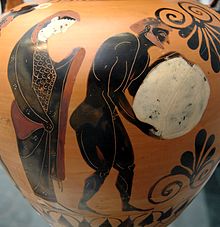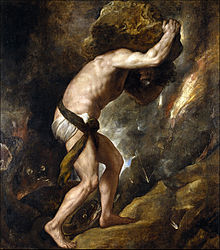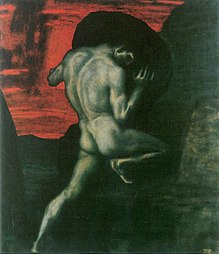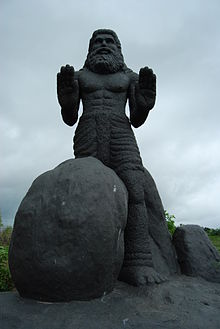Sisyphus
![]()
This article is about the person of Greek mythology. For other meanings, see Sisyphus (disambiguation).
Sisyphus (Ancient Greek Σίσυφος, Latinized Sisyphus) is a character in Greek mythology. He was a son of Aiolos and king in Corinth. Sisyphus was distinguished by great wisdom and contributed greatly to the aggrandizement of Corinth.
Today he is known above all in his function in popular belief as a mischievous, cunning rascal and archetype of the "sacrilegious man" who despises people and gods and who, through unscrupulous cunning, succeeds several times in trickily cheating death and blocking the flow to Hades by tying up the god of death Thanatos. After his release, Sisyphus is imprisoned, but the dead man manages to return to life once again with a ruse: He orders his wife, the Pleiadian Merope, not to bury him or offer any sacrifices for the dead. To settle this nuisance, Thanatos releases him into life once more, allowing Sisyphus to escape death one more time.
The punishment inflicted on Sisyphus has become proverbial. Homer gives no reason for the punishment, which is why even in antiquity different authors give different reasons for it: Once Sisyphus is punished for his rebelliousness towards the god Thanatos, once for his craftiness, once because he betrays Zeus, the father of the gods, to Asopos, the river god, for stealing his daughter Aigina. Finally, he is forced by Hermes into the underworld for his outrage, where as punishment he must roll a boulder forever up a mountain, which, almost at the summit, rolls back down into the valley each time. This motif was already characteristic of the reception of Sisyphus in antiquity, and today Sisyphus' work or Sisyphus' task is a common word for an unproductive and difficult activity with no foreseeable end.
In modern times, Sisyphus became a leading figure of absurdism through Albert Camus' essay The Myth of Sisyphus. This radical reinterpretation revived the reception of Sisyphus and stimulated many other new interpretations of the Sisyphus figure.

Persephone supervising Sisyphus in the underworld, black-figure Attic amphora, c. 530 BC, Staatliche Antikensammlungen (Inv. 1494)
Myth
Sisyphus is considered in Greek mythology to be the son of the Thessalian king Aiolos, the founder and king of Corinth, and the grandfather of Bellerophon.
Ino had killed Melikertes, her own son, in madness and had thrown herself into the sea with the corpse when she regained her senses. A dolphin brought the boy ashore. Sisyphus found him, buried him on the Isthmus of Corinth and, according to Pindar and others, founded the Isthmian Games in his honour, for which Theseus and Poseidon are also named as founders.
Sisyphus asked the Oracle of Delphi how he could kill his brother Salmoneus. He received the answer that he should father children with Tyro, the daughter of Salmoneus. These would then kill Salmoneus. He became involved with Tyro, and she gave birth to two sons. However, when she heard about the oracle, she killed her own children.
Autolykos secretly stole cattle, sheep and goats from Sisyphus. The latter noticed that his herds were getting smaller while those of Autolykos continued to increase. He marked his animals on their hooves and was thus able to prove the theft. He went to Autolykos to confront him. But since he did not find him, he seduced his daughter Antikleia, who shortly afterwards married Laertes and gave birth to Odysseus.
Sisyphus is called the most devious of all men; he betrayed Zeus' plans by telling the river god Asopos that it was Zeus who had kidnapped his daughter Aigina. Zeus then decided to punish Sisyphus and sent Thanatos, Death, to him. But Sisyphus overpowered him by making him drunk and putting him in such strong bonds that Death's power was broken and no one died. Only when Ares, the god of war, released Death from Sisyphus' grip (since he didn't enjoy seeing his opponents no longer dying on the battlefield) was Thanatos able to resume his duties.
Sisyphus, however, was abducted into the shadow realm by the god of war. But before Ares did so, Sisyphus forbade his wife Merope to offer him a sacrifice for the dead. When no sacrifices were offered for him, he persuaded the god of the underworld, Hades, to let him return quickly to the human world to command his wife to hold a death sacrifice for him. Back home, the cunning one enjoyed life by his wife's side and mocked the god of the underworld. But suddenly Thanatos appeared before him and brought him by force to the realm of the dead.
Sisyphus' punishment in the underworld was to roll a boulder up a steep slope. However, the stone always slipped away from him shortly before he reached the top and he always had to start over again. Today, therefore, a task that is never completed despite great effort is called Sisyphean work.
"And further I saw Sisyphus in tremendous pain: how with both arms he tried to carry away a boulder, a monstrous one. Yes, and with his hands and feet he pushed the boulder up a hill. But when he wanted to throw it over the crest, the excess weight turned it back: then anew the boulder, the shameless one, rolled down into the field. But he pushed it back again and again, straining, and the sweat ran from his limbs, and the dust rose above his head."
- Homer: Odyssey 11th canto, 593-600. translation Wolfgang Schadewaldt

Titian's depiction of Sisyphus

Sisyphus by Franz von Stuck, 1920
Naranath Bhranthan
The ancient Indian legend of Naranath Bhranthan, also called "the madman of Naranam", shows how differently the same image can be interpreted in a context other than that of the Occident: Like Sisyphus, he too rolled a huge stone up a high mountain again and again, though unlike the latter voluntarily, but only to enjoy afterwards, as if irrepressibly, the rolling of the stone back down into the valley. The mountain named after him, Naranathu Brandhan Mala in the district of Palakkad in the south Indian state of Kerala, is the destination of numerous pilgrims every year in mid-October.

Statue of Naranath Branthan
Questions and Answers
Q: Who was Sisyphus?
A: Sisyphus was a legendary person in Greek mythology.
Q: What was Sisyphus forced to do according to the ancient story?
A: Sisyphus was forced to roll a big rock up a hill.
Q: Was Sisyphus successful in rolling the rock up the hill?
A: No, the rock rolled back down and the task was never finished.
Q: How long was Sisyphus forced to repeat the task?
A: Sisyphus was forced to repeat the task over and over again forever.
Q: What is the meaning of the word "Sisyphean"?
A: The word "Sisyphean" relates to a task which is undertaken with great effort but is ultimately pointless.
Q: Where is the word "Sisyphean" derived from?
A: The word "Sisyphean" is derived from the myth of Sisyphus in Greek mythology.
Q: Why is the story of Sisyphus significant?
A: The story of Sisyphus is significant because it inspired the concept of a task that is never completed and relates to the struggle of human existence.
Search within the encyclopedia